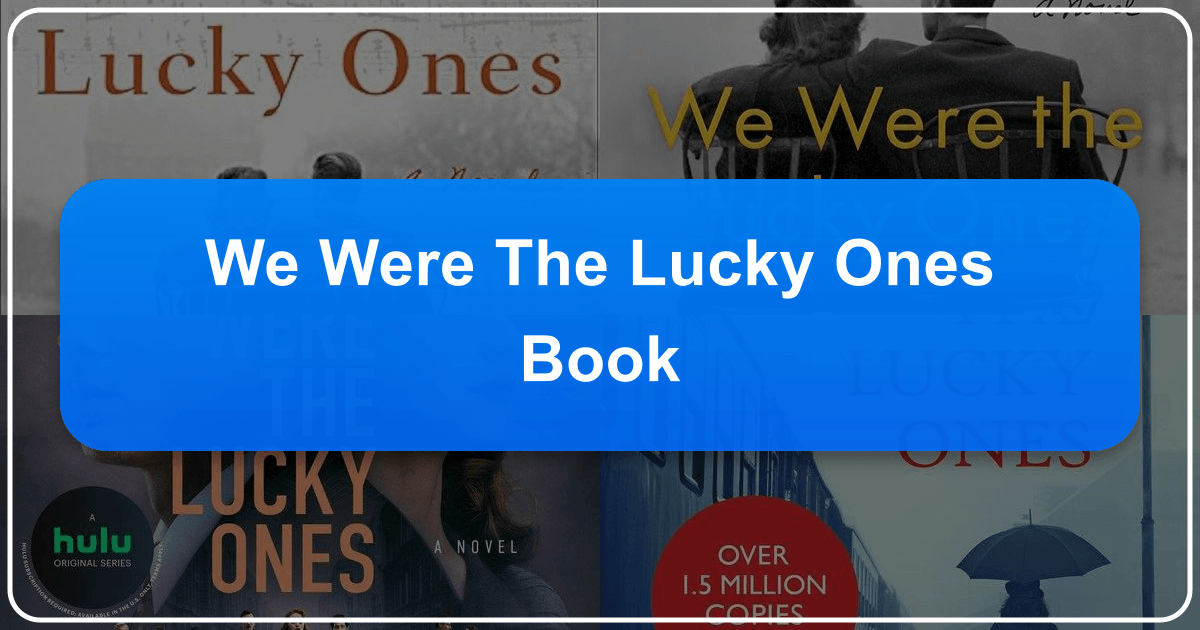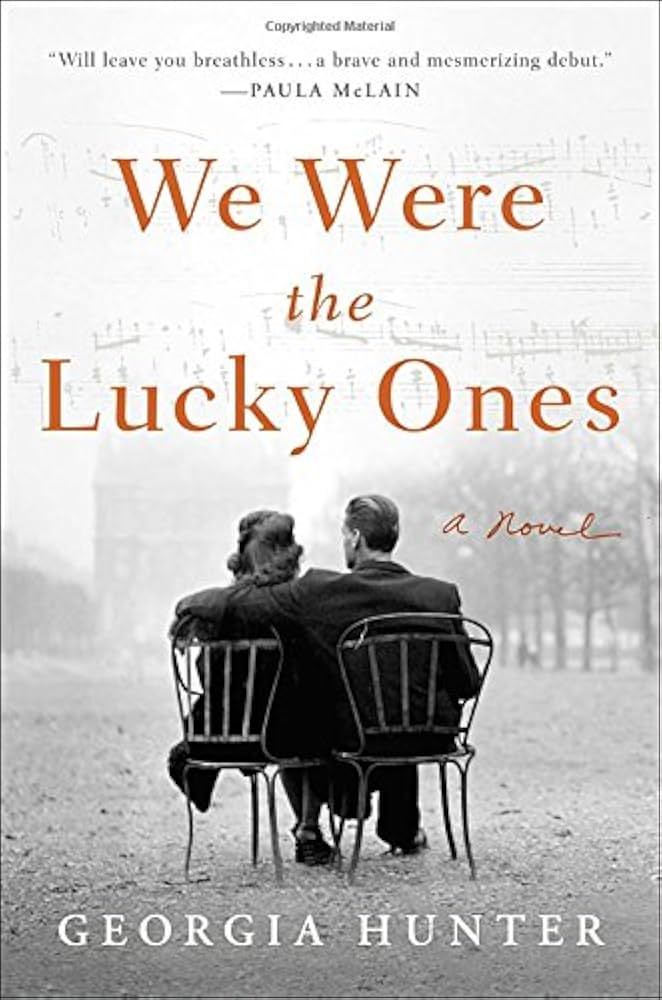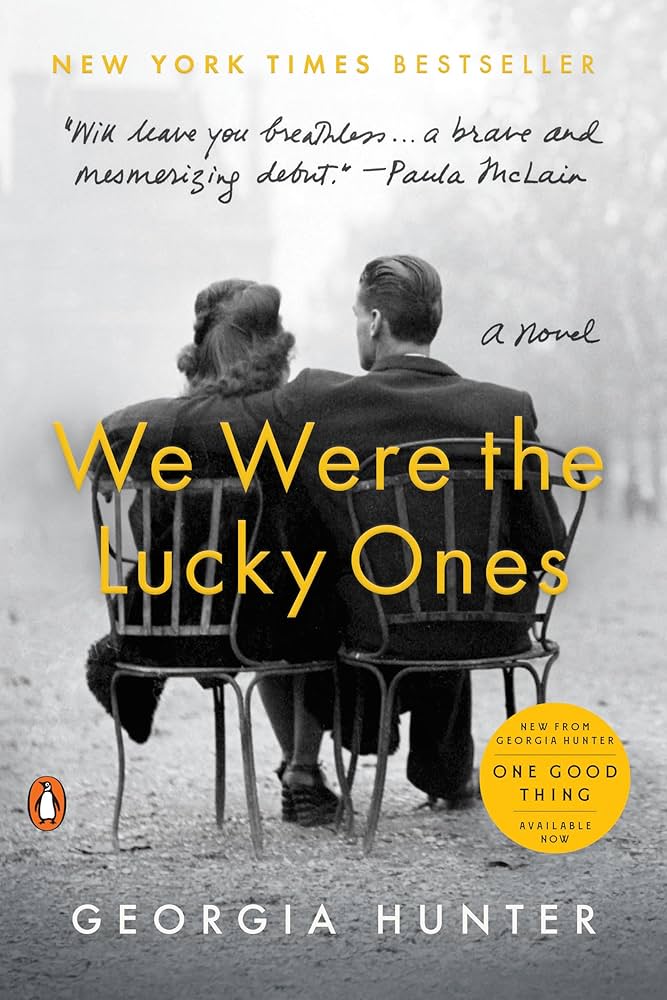*We Were the Lucky Ones* Book: A Comprehensive Review

This in-depth article explores Georgia Hunter’s acclaimed novel, We Were the Lucky Ones, examining its various aspects through the lenses of genre, authorship, educational value, and cultural impact. The book, inspired by the author’s own family history, tells the harrowing yet ultimately hopeful story of a Polish-Jewish family scattered across the globe during World War II. We will delve into the narrative’s compelling aspects, exploring its literary merit and its enduring resonance.
Genre and Literary Style

We Were the Lucky Ones is classified as historical fiction, a genre that blends factual historical settings and events with fictional characters and narratives. Hunter masterfully crafts a story rooted in the grim realities of the Holocaust and the turbulent geopolitical landscape of World War II. However, she does not shy away from injecting moments of hope, love, and resilience, making it a deeply emotional and engaging read.
The novel’s strength lies in its ability to seamlessly intertwine historical accuracy with a compelling human story. Hunter meticulously researches the historical context, providing factual snippets between chapters that enrich the narrative without overshadowing the fictional elements. This approach allows readers to fully immerse themselves in the era while remaining captivated by the emotional journeys of the Kurc family.

The narrative structure itself is a significant element of the book’s literary success. The story unfolds through multiple perspectives, shifting between the experiences of various family members. This technique provides a multifaceted view of the war’s impact, showcasing the diverse challenges faced by each individual within the same family unit. This keeps the narrative dynamic and offers readers a more complete understanding of the emotional and psychological toll of displacement, persecution, and loss. The present tense used throughout the novel further enhances this immersive experience, making readers feel intimately involved in the family’s struggles and triumphs.
Character Development and Relationships
The characters in We Were the Lucky Ones are richly developed, each possessing distinct personalities, motivations, and responses to the horrors of war. The author’s intimate knowledge of her family’s history, from which the novel is based, shines through in the authenticity and complexity of these characters. Their flaws and strengths are equally highlighted, making them relatable and human despite the extraordinary circumstances they navigate.

The dynamics between the Kurc family members form the emotional core of the novel. The love and resilience that bind them together, despite the physical and emotional distances imposed by the war, is a powerful theme throughout the narrative. The bonds of siblinghood, romantic love, and familial loyalty are repeatedly tested, yet ultimately prevail in the face of unimaginable adversity. The relationships depicted in the book highlight the strength of human connection in the midst of global chaos.
Authorial Background and Influences
Georgia Hunter’s personal connection to the story profoundly shapes her approach to We Were the Lucky Ones. The author’s discovery of her family’s history at the age of fifteen served as the catalyst for this novel, instilling in her a profound desire to understand and share their experiences. This personal investment is evident in the emotional depth and authenticity of the narrative.
Hunter’s extensive research, meticulously documented on her website (Lbibinders.org), informs the historical accuracy of the novel. The inclusion of factual information within the narrative is not just for background details; it enhances the emotional impact of the fictional elements by grounding the story in reality. Hunter’s careful blend of research and creative writing produces a truly immersive historical fiction experience, capturing the spirit of the time while remaining emotionally resonant.
The Author’s Writing Style
Hunter’s writing style is characterized by its clear, direct prose. She avoids overly sentimental or melodramatic language, focusing instead on providing a realistic and unflinching portrayal of the family’s experiences. While the subject matter is inherently dark and disturbing, Hunter’s skillful writing ensures that the narrative never feels gratuitous or sensationalized. Instead, the emphasis is on the human spirit’s perseverance, its ability to find hope and love in the darkest of times. This directness and unadorned style allows the reader to focus on the raw emotion and underlying themes without being distracted by flowery or overly descriptive language.
Educational Value and Life Lessons
We Were the Lucky Ones transcends its role as a gripping historical fiction novel. The book offers valuable lessons in resilience, hope, and the enduring power of family. Reading this novel can be a profoundly moving educational experience, offering insights into the Holocaust and the effects of World War II on individuals and families. It provides a personal account that amplifies the historical events, conveying the profound human cost of conflict and persecution.
The book subtly but powerfully explores themes of identity, prejudice, and the fragility of life. The Kurc family’s struggles highlight the importance of hope and the strength that can be found within even the most desperate situations. The novel’s narrative is ultimately an affirmation of the human spirit’s capacity to overcome adversity and find a way to thrive. The reader can draw profound life lessons from the family’s experience. The themes of perseverance, love, and the importance of family can resonate deeply and offer valuable life lessons, even years after completing the book.
Historical Context and Relevance
The historical context woven throughout the novel provides a crucial layer of understanding. Hunter’s meticulous research illuminates the social, political, and economic realities faced by Jews in Poland before and during the war. The historical interludes provide a broader perspective on the events unfolding around the Kurc family.
The novel’s relevance extends beyond its historical setting. It addresses themes that remain tragically relevant today: xenophobia, prejudice, the abuse of power, and the importance of empathy and understanding. The enduring power of the human spirit to overcome adversity, which is the heart of the novel, can provide hope and inspiration amidst global uncertainty.
Cultural Impact and Reception
We Were the Lucky Ones has received widespread critical acclaim, earning numerous accolades and positive reviews from prominent literary figures. Its compelling narrative and impactful themes have resonated with readers worldwide, solidifying its place as a significant work of historical fiction. The novel has been included in numerous “best of” lists, further testament to its cultural impact.
The book’s adaptation into a Hulu limited series starring Joey King and Logan Lerman has broadened its reach to a wider audience, further increasing its cultural impact. The television adaptation provides a new avenue for audiences to engage with the story and its profound themes. The successful television adaptation expands the novel’s reach, reinforcing its cultural impact and ensuring that the experiences of the Kurc family resonate with a broader contemporary audience.
Awards and Recognition
The novel’s success is further validated by the numerous awards and recognitions it has received. These awards serve as a testament to the novel’s literary merit and its significant contribution to the understanding of the Holocaust and the human experience during World War II.
Libraries and Archives
Given the novel’s historical significance and the meticulous research undertaken by the author, We Were the Lucky Ones has found a place in numerous libraries and archives. Public libraries are likely to hold copies of the novel, making it accessible to a wide range of readers. Digital libraries offer online access to the text, expanding its availability even further. This widespread availability ensures the book continues to be a valuable resource for researchers, educators, and readers alike.
The Role of Research and Archives
Hunter’s use of archives and historical research formed the backbone of the book’s credibility and emotional depth. Accessing and interpreting archival materials, such as letters and documents, is integral to the novel’s authenticity. These resources are pivotal in conveying the lived experiences of those affected by the war and offer insight into the world of the Kurc family.
In conclusion, We Were the Lucky Ones is more than just a historical fiction novel; it is a powerful and moving story that transcends time and place. Through its compelling narrative, well-developed characters, and meticulous historical research, the book delivers a profound exploration of human resilience, family, and the enduring power of hope in the face of unimaginable adversity. Its accessibility in various formats and its adaptation into a successful TV series ensures its lasting influence on readers and viewers alike, cementing its place as a significant work of contemporary literature.